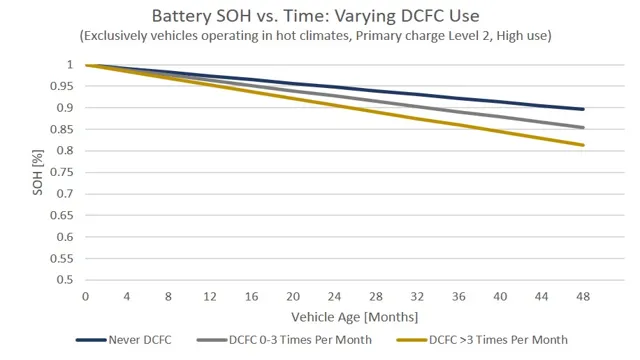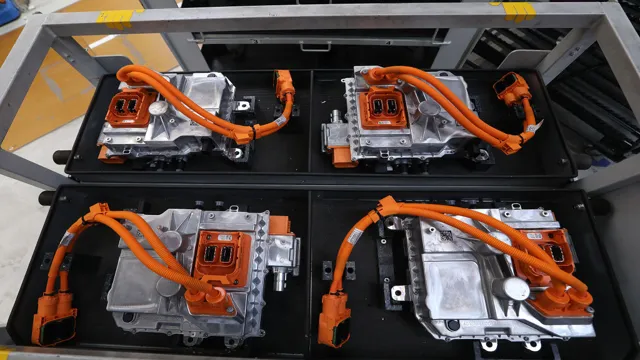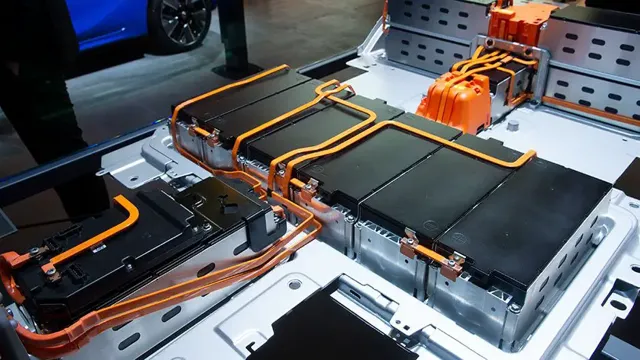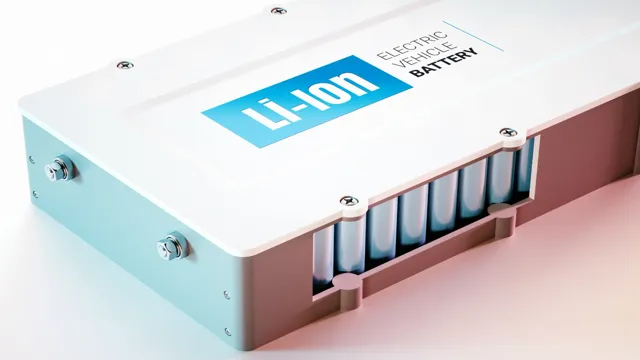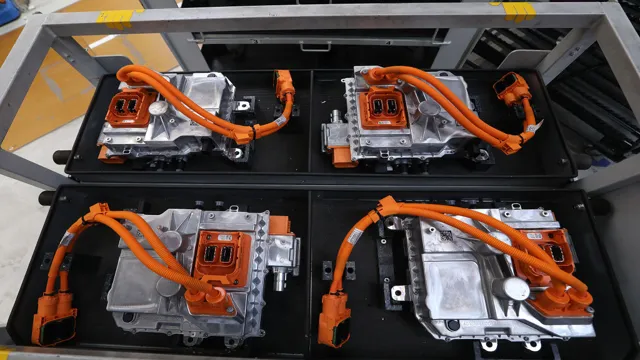The Shocking Truth about Average Electric Car Battery Capacity: How it Affects Range and Performance
Electric cars have been steadily growing in popularity over the years, with many people recognizing their potential to significantly reduce greenhouse gas emissions and contribute to a sustainable future. However, one of the main concerns that people have about electric cars is their battery capacity. How far can they really go on a single charge? Is the technology advanced enough to make EVs a viable everyday option? In this data-driven overview, we’ll take a closer look at the state of electric car battery capacity today and what we can expect in the future.
Let’s dive in and explore the exciting world of electric cars!
What is the average battery capacity of an electric car?
When it comes to electric cars, the battery capacity is a crucial element that determines the range or driving distance a vehicle can travel on a single charge. The average electric car battery capacity varies depending on the model and manufacturer. However, recent studies show that the median battery pack size for new electric cars is around 66 kilowatt-hours (kWh).
This means that most electric vehicles can travel between 220 to 250 miles per charge, which is enough for daily commutes and occasional long-distance trips. Nevertheless, some electric cars have larger battery capacities, enabling them to achieve a longer range. For instance, Tesla’s Model S Long Range Plus has a battery capacity of 100 kWh and can travel up to 402 miles on a single charge, making it one of the electric cars with the longest range on the market.
Exploring the range of electric car battery capacities
Electric car battery capacities vary widely depending on the make and model of the car. On average, electric car battery capacity ranges from around 40 kWh to 100 kWh. However, some high-end electric cars can have battery capacities as high as 200 kWh.
The battery capacity affects how far an electric car can travel on a single charge. Generally, the higher the battery capacity, the longer the range. For example, a car with a 40 kWh battery may have a range of around 100 miles, whereas a car with a 100 kWh battery may have a range of 250 miles or more.
However, battery capacity is not the only factor that affects range, as external factors like driving conditions, temperature, and speed can also impact how far an electric car can travel on a single charge. Overall, electric car battery capacities are constantly improving, with new models being released with increasingly higher capacities that allow for longer ranges and more practicality for everyday use.
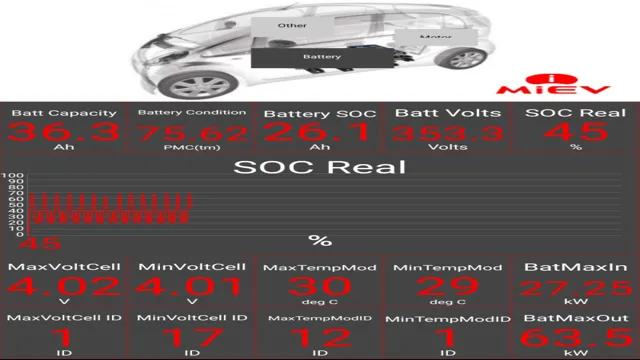
Comparing battery capacities of popular electric car models
As electric cars become increasingly popular, one important consideration for prospective buyers is the battery capacity. The average battery capacity of an electric car can vary greatly depending on the make and model. For example, the Tesla Model S boasts a battery capacity of up to 100 kWh, while the Nissan Leaf has a more modest capacity of up to 62 kWh.
Other popular models, such as the Chevrolet Bolt and the Hyundai Kona Electric, fall somewhere in between with battery capacities of around 66-75 kWh. So, what does all this mean for drivers? Essentially, the battery capacity determines how far you can travel on a single charge. Cars with higher battery capacities generally have longer ranges, which can be advantageous for those with longer commutes or who frequently take road trips.
It’s also important to consider charging options – some cars may have faster charging times, allowing you to quickly top up your battery and get back on the road. When it comes to purchasing an electric car, weighing the various factors – including battery capacity – can help you make an informed decision that meets your needs.
How does battery capacity affect electric car performance?
When it comes to electric cars, the average battery capacity can greatly affect its overall performance. The battery is the heart of an electric car and is responsible for providing the power needed to drive. The higher the battery capacity, the longer the electric car can go without needing to recharge.
In general, the average electric car battery capacity ranges from 40 to 100 kWh. A larger battery capacity means a higher range and faster acceleration. However, it also means a heavier car, which can reduce efficiency.
Electric cars with larger battery capacities generally have a higher price tag, but they also provide better performance and increased driving range. Ultimately, the battery capacity of an electric car is a crucial factor to consider when deciding on which model to buy.
Understanding range anxiety and its relationship to battery capacity
Battery capacity plays a significant role in the performance of electric cars, particularly when it comes to range anxiety. Range anxiety is a term used to describe the fear of running out of battery before reaching your destination. The higher the battery capacity, the longer the driving range, and the lower the risk of running out of power mid-journey.
It’s important to note that the range of an electric vehicle (EV) can vary depending on several factors such as speed, driving style, terrain, and weather conditions. Nevertheless, increasing battery capacity is the primary way to extend an EV’s driving range and eliminate range anxiety. EV manufacturers are continuously working to develop better battery technologies that can provide long-range driving while keeping charging times reasonable.
In summary, the battery is the heart of the EV, and its capacity has a direct impact on range anxiety and the overall performance of the car on the road.
The impact of battery capacity on acceleration and speed
Battery capacity plays a significant role in the performance of electric cars. The battery is the primary source of power for the vehicle, and its capacity determines how much energy can be stored and used. A higher capacity battery means it can store more energy, resulting in better acceleration and speed.
The most apparent impact of battery capacity on a car’s performance is how it affects the range of the vehicle. Essentially, the more power the battery has, the more extended the distance that the car can travel without needing to recharge. However, a higher capacity battery does add weight to the car, which can affect its speed and acceleration.
The car will need more power to move the extra weight of the battery, which can lead to a decrease in acceleration and speed. Despite this, the overall performance of electric vehicles is still impressive, and advancements in battery technology are helping to overcome many of these obstacles.
Factors that can affect battery capacity over time
Battery capacity can have a significant impact on the performance of an electric car over time. Several factors can affect battery capacity, such as temperature, charging frequency, and depth of discharge. The higher the temperature of the battery, the faster its capacity degrades, which can lead to reduced driving range and acceleration.
Frequent charging can also affect battery capacity by accelerating the aging of the cells, ultimately reducing their overall capacity. A battery’s depth of discharge refers to the percentage of energy used before recharging, and discharging a battery to a deeper level can cause more significant impacts on capacity over time. All of these factors can impact electric car performance, but proper maintenance, including monitoring battery health and temperature, can help ensure that the battery operates at its best for as long as possible.
The future of electric car battery capacity
As electric cars continue to gain popularity, the average electric car battery capacity is expected to increase significantly in the coming years. Advancements in technology will allow for batteries to become more efficient and store more energy, resulting in longer driving ranges and shorter charging times. One example of this is the Tesla Model S, which currently boasts a range of over 300 miles on a single charge.
As battery capacity increases, it will become easier and more practical for drivers to make long distance trips without worrying about running out of charge. Additionally, as more electric cars hit the market and competition increases, manufacturers will have more incentive to improve battery technology and offer higher capacity models. With these developments, electric cars could become the norm in the near future, helping to reduce our reliance on fossil fuels and reduce carbon emissions.
Predictions for increasing battery capacity in the next 5 years
When it comes to the future of electric car battery capacity, the possibilities are exciting, and the improvements are remarkable. With advances in technology, it’s predicted that in the next five years, there will be a significant increase in the capacity of batteries for electric cars. Some scientists speculate that there may even be a breakthrough in battery storage, which could significantly reduce the weight and size of battery packs, allowing vehicles to travel longer distances without the need for recharging.
The potential of increasing battery capacity can also revolutionize the way we think about energy storage and change the adoption rate of electric vehicles. As battery technology continues to advance, it’s safe to say that the future of electric cars looks brighter than ever before.
Innovative research and development in battery technology
As electric cars become increasingly popular, battery technology must keep pace to support the growing demand. Innovative research and development in battery technology, including advancements in materials, chemistry, and manufacturing processes, is constantly leading to improved battery capacity. Current lithium-ion batteries have a range of around 300 miles on a single charge, but researchers are exploring new technologies that could push this range even further.
Solid-state batteries are one promising option, as they could potentially offer twice the energy density of current lithium-ion batteries. Another possibility is lithium-sulfur batteries, which have the potential to be even more energy-efficient than current lithium-ion batteries. As research continues, the future of electric car battery capacity looks bright, and we can expect electric cars to become even more practical and convenient for everyday use.
Final thoughts: Considerations for choosing an electric car based on battery capacity
When it comes to choosing an electric car, understanding the average battery capacity is an important consideration. The battery capacity determines how far the car can go on a single charge and can range anywhere from 50 kWh to over 100 kWh. A larger battery capacity means a longer driving range, but it also means a heavier and more expensive car.
It’s important to consider your daily driving habits and how far you typically travel in a day. If you have a long commute or frequently travel long distances, a larger battery capacity may be worth the investment. However, if you primarily use your car for short trips around town, a smaller battery capacity may be more practical.
Ultimately, the decision comes down to your personal needs and preferences.
Conclusion
It’s not just about the size of the battery, it’s how you use it. So whether you’re cruising around town or embarking on a long road trip, remember to make the most of what you’ve got – after all, it’s not the size of the battery that matters, it’s how efficiently you can recharge it!”
FAQs
What is the average capacity of an electric car battery?
The average capacity of an electric car battery is around 60 kWh.
How long does it take to charge an electric car battery to full capacity?
The time it takes to charge an electric car battery to full capacity can vary depending on the charging speed and the capacity of the battery. On average, it takes around 8 hours to fully charge a 60 kWh electric car battery using a Level 2 charger.
How far can an electric car travel on a single charge?
The distance an electric car can travel on a single charge can vary depending on the size of the battery, the driving conditions, and the driving style. However, on average, an electric car with a 60 kWh battery can travel around 200 miles on a single charge.
What factors affect the lifespan of an electric car battery?
The lifespan of an electric car battery can be affected by various factors, such as temperature, charging habits, and usage patterns. For example, exposing the battery to extreme temperatures can reduce its lifespan, and fast charging frequently can degrade the battery over time.
